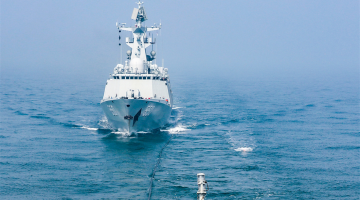By Yan Yan
The Coast Guard Law of the People's Republic of China officially came into effect on February 1, drawing much attention in the international community. Some doubt whether the China Coast Guard (CCG) will become the country’s “second navy,” asking on what conditions the maritime division of the Chinese People’s Armed Police Force (PAP) uses force in law enforcement, and questioning if the new law’s provisions on the use of police equipment and weapons comply with the international law. Some have gone so far as to clamor that China’s enaction of the Coast Guard Law risks triggering possible regional tension.
The CCG is the maritime enforcement service of China that exercises the maritime rights, duties, and obligations endowed by international laws, including the United Nations Convention on the Law of the Sea. It was put under the command of the PAP in 2018. China’s latest Coast Guard Law provides the legal basis for the coast guard service to carry out tasks, specifies the legal properties of CCG as a civil law enforcement division, and stipulates its rights, duties, and obligations, including administration of sea areas under Chinese jurisdiction and international cooperation.
In terms of nature, CCG is both an administrative law enforcement unit and an armed force similar to the maritime enforcement agencies of other countries. For instance, the United States Coast Guard (USCG) is an important part of the US armed forces, and it boasts the largest scale and most advanced weapons and equipment of all maritime enforcement services in the world. Coast guards in Australia, as a maritime police force, is directly commanded by the Australian Defence Force in wartime. The Philippine Coast Guard (PCG) is a standard service agency attached to the Department of Transportation of the Philippines, but it serves as an attached service of the Department of National Defense in wartime. The Malaysian Maritime Enforcement Agency(MMEA),formally known as Malaysia Coast Guard, can be integrated under Malaysian Armed Forces command during an emergency, special crisis, or wartime. And the Vietnam Coast Guard is also a branch of Vietnam’s military, the Vietnam People’s Army, serving specific purposes.
In terms of function, the maritime enforcement agencies in various countries perform the following duties – maritime security, search and rescue, marine ecology and resource protection, etc. The CCG carries out administrative law enforcement in five areas - the same as its foreign counterparts, namely managing maritime security, combating maritime smuggling, conducting the supervisory inspection of the development and utilization of marine resources, protecting marine ecology and environment, and managing marine fishery operations.
The provisions in China's Coast Guard Law on the use of force, police equipment, and weapons are consistent with international law rules and within the boundary of current national practices.
In the South China Sea, for instance, the struggle for fishing resources has been a tipping point of conflicts among various parties, and the conflict between fishing boats and maritime law enforcers poses a serious challenge to maritime security in the region. However, the fact is that the Chinese maritime enforcement service has never used force against foreign fishers that are carrying out normal fishing activities in surrounding waters. When they enforce the law against foreign fishers that are fishing illegally in disputed waters, they also exercise a high level of restraint and adopt only minimal enforcement measures without ever violating the principle of necessity and proportionality on the use of force as stipulated in international law, or threatening fishers from surrounding countries. On the contrary, some countries around the South China Sea have adopted increasingly aggressive means in their maritime law enforcement over recent years.
The use of force in maritime law enforcement is sensitive because it could easily aggravate conflict during the confrontation on site. Some countries in the region have proposed that “the international law prohibits the use of force unless authorized by the UN Security Council and being self-defense operations meeting the principle of proportionality”. These countries are concerned about in which sea areas the CCG will enforce the law because they are worried that the presence of Chinese law enforcement force in disputed waters will consolidate the country’s actual control there.
As a matter of fact, international law doesn’t prohibit the use of force when enforcing the law in disputed waters. The use of force in law enforcement doesn’t mean the “use of force” that the UN Charter asks the member states to refrain from, but refers to the maritime police operations carried out by coastal nations in disputed waters according to their domestic law. The Chinese maritime enforcement service has always exercised goodwill and restraint when performing maritime operations and will not violate the principle of necessity and proportionality in the future. Besides, the Chinese Coast Guard Law has dedicated chapters on supervision and legal liabilities and puts in place such systems as transparent law enforcement, recording of law-enforcing process, and accountability of faults during law enforcement.
Some countries and some media that are in the habit of smearing China should stop practicing “double standards” and viewing China and everything Chinese with biases. On the one hand, before the Coast Guard Law was enacted, they criticized China for lacking legal supervision over its maritime law enforcement; on the other hand, they deliberately distort and misinterpret certain contents in the latest law. Demonizing this law does no good to increasing the mutual trust and law enforcement cooperation between China and relevant countries, nor does that serve regional peace and stability.
Given the increasingly complicated maritime security situation, international cooperation between law enforcement agencies of various countries is an important way to effectively improve maritime governance, mitigate the tension in disputed waters, strengthen crisis management and control, and build mutual trust.
The latest Coast Guard Law also standardizes the cooperation mechanism between the CCG and foreign maritime enforcement agencies and international organizations by specifying the scope – such as jointly striking crimes on the sea – and cooperation approach. This will undoubtedly promote bilateral or multilateral maritime enforcement cooperation between China and relevant countries and facilitate them in jointly preserving the maritime public security and order.
Taking the opportunity of China’s implementation of the Coast Guard Law, the international community should walk toward China with goodwill and a positive attitude to advance bilateral or multilateral maritime enforcement cooperation based on law and rules. Relevant parties should work together to establish an international new order of naval cooperation and governance, writing a new chapter in protecting the marine environment, fighting cross-border maritime crimes, and safeguarding maritime security.
(The author is Director of the Research Center of Oceans Law and Policy in the National Institute for the South China Sea Studies(NISCSS).)
Editor's note: This article is originally published on huanqiu.com, and is translated from Chinese into English and edited by the China Military Online. The information, ideas or opinions appearing in this article do not necessarily reflect the views of eng.chinamil.com.cn.









